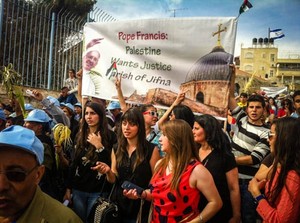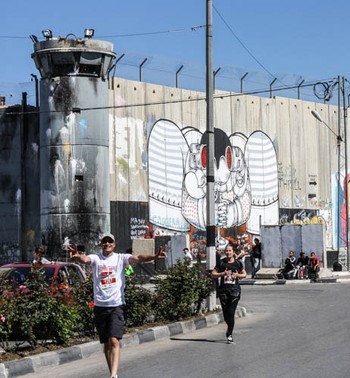Roughly 3,200 runners competed in the second annual Palestine Marathon, which took place in the occupied Palestinian city of Bethlehem April 11.
Race organizers aimed to provide Palestinian runners the opportunity to run in their own race as well as to highlight the restrictions placed on Palestinians’ movement within and from the West Bank and Gaza.
Race organizers referred to Article 13 of the United Nations Universal Declaration of Human Rights, which states, “Everyone has the right to freedom of movement.”
It is impossible to find 42 kilometers of uninterrupted land in Bethlehem, so the race course required runners, even those running shorter distances, to circle the course twice.
As one runner, Nadia, put it, “To have to loop in order to run a 10K is crazy. The race brings attention to the reality here for Palestinians every day.”
Palestinians’ daily lives are affected by a number of restrictions. According to Israeli human rights organization “B’Tselem” there were 99 fixed checkpoints in the West Bank as of February 2014, 59 of which were internal checkpoints, separating Palestinians from Palestinian territory.
In addition, the U.N. Office for the Coordination of Humanitarian Affairs counted more than 200 temporary checkpoints in December 2013. Israel also blocks access to roads with hundreds of physical obstructions, such as dirt embankments, trenches and concrete blocks.
Some roads are completely off-limits to Palestinians. As of February 2014, there were 65.12 kilometers of road designated for the sole purpose of Israelis, primarily settlers, which Palestinians are not even allowed to cross in order to reach non-restricted roads.
Additionally, the “separation wall” cuts deep into the West Bank and further restricts Palestinians’ movement, cutting off farmers from their land, family members from one another, employees from their jobs, students from their schools, and the sick from hospitals.
Palestinians living in the West Bank and those living in Gaza are also isolated from one another. A Gazan who applied for a permit to attend the Palestine Marathon was denied by the Israeli Supreme Court.
Many runners, Palestinians and internationals alike, cited their desire to protest these restrictions of movement as the reason for their participation in the race. Shadia, a Palestinian Christian citizen of Israel told me, “As a Palestinian, it is important to find a healthy way to say this occupation is wrong, that everyone has the right to freedom of movement. It is our responsibility as Christians to speak against suffering and find nonviolent ways to act against it.”
Palestinian Christians are particularly affected by restrictions on movement this time of year. Thousands apply for permits to go to Jerusalem during Holy Week, and the majority do not receive them.
Even those granted permits are often obstructed from accessing holy sites because of barriers and checkpoints erected by soldiers in and around the Old City, where many of the significant religious sites are located.
Many East Jerusalem Palestinian Christians filed a petition to the Israeli High Court of Justice this year, requesting the State to drop the heavy movement restrictions that have prevented worshippers from accessing religious sites on Holy Saturday, the day before Easter.
They cited incidents in 2013 in which soldiers roughed up worshippers and clergy on their way to worship, and also denied access to various groups who had made arrangements in advance. The High Court responded to the petition by saying it had no reason to intervene in reasonable police actions.
A group of Palestinian Christians released a statement on April 6 saying that Israel’s restrictions on movement violate religious freedoms, claiming these restrictions are a part of a wider effort to deny a Palestinian Christian presence in the city of Jerusalem.
The statement called on local Christians to attempt to attend Easter celebrations despite the obstacles.
On Sunday, April 13, thousands of pilgrims, both internationals and Palestinians, turned out for the Palm Sunday procession from the Church of Bethphage on the Mount of Olives to the Old City of Jerusalem. Palestinians carried signs representing the different parishes across the West Bank and Gaza, including the parishes of Jenin, Beit Sahour, Gaza, and Nablus, among others.

Christian Palestinians from the West Bank town of Jifna carry a banner with a bold message to the Pope as they walk in the Palm Sunday procession past an Israeli settlement in the East Jerusalem neighborhood on the Mount of Olives. —Kate Taber
The banners honored both the Christian presence across occupied Palestine and those from each community who were not able to be present due to denied permits.
Each sign from the different parishes bore the same message, “Pope Francis: Palestine Wants Justice.” The pontiff will be visiting the Holy Land at the end of May.
While the minority of Palestinian Christians who received permits to Jerusalem spend the week hoping they will be granted entrance to the Old City, thousands of Jews will visit the Western Wall in celebration of Passover. For them, there are no permit applications or Old City checkpoints.
The Rev. Kate Taber is a newly-appointed Presbyterian Church (U.S.A.) mission co-worker in Israel-Palestine, where she serves as facilitator for peacemaking and mission partnerships, Israel-Palestine.

